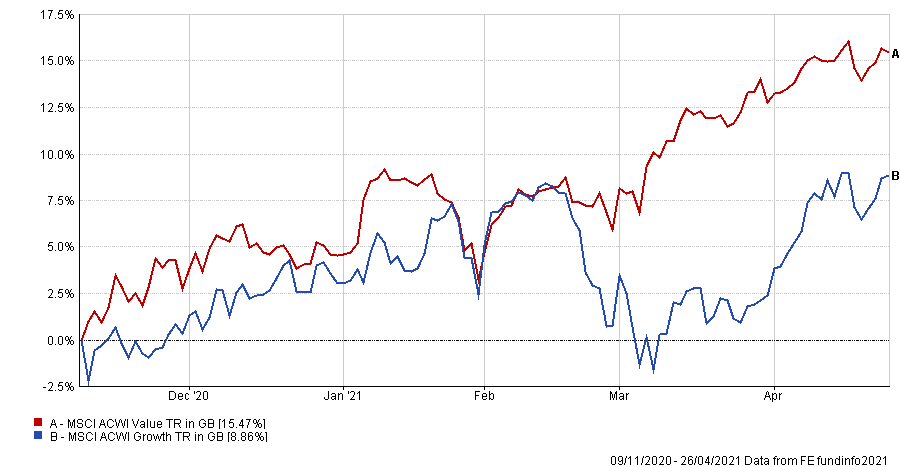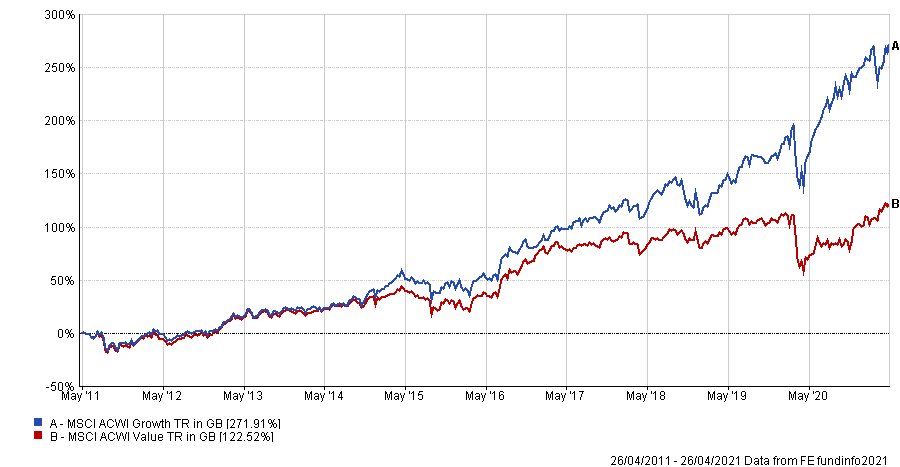Investors who entered the market in the previous five to eight years have witnessed their first significant market rotation in the past six months, and first challenge to their portfolios. So, what do they need to bear in mind to stomach their first market rotation?
Since the Covid-19 vaccine was announced in early November last year markets have seen a pronounced shift out of growth stocks and into value.
Performance of MSCI ACWI Value vs MSCI ACWI Growth since Pfizer Monday

Source: FE Analytics
An effective vaccine ultimately removed the ‘worst case scenario’ of the pandemic indefinitely continuing, allowing investors to start pricing in a strong Covid-19 bounce back. This was combined with increasing inflation expectations.
In recovery environments like this, value and cyclical stocks tend to prosper, which led investors away from growth stocks for the first time in about a decade. The previous years had been characterised by loose monetary policy and low interest rates, all highly accommodative to growth.
Performance of MSCI ACWI Value vs MSCI ACWI Growth over 10yrs

Source: FE Analytics
For investors who started their investment journeys during that time, and ultimately fell more onto the side of growth, the past six months have seen their portfolios really struggle. So what do they need to remember as they go through this rotation?
“Primarily don’t panic,” said Darius McDermott, FundCalibre managing director. “It’s not a case that growth can’t generate returns and have a good performance, it might just not be as good as the levels seen in the last bull market.”
Cycles are a normal thing in markets, there just hasn’t been a style one for almost a decade. 
David Jane (pictured), manager of several multi-asset funds at Premier Miton Investors funds, added that no one style, asset class or region will perform well at all times.
Indeed, go back 10 years and emerging markets was the region everyone was investing in, according to Alastair McKinnon, manager of The Scottish Investment Trust.
“It's an emerging middle class, there's going to be a shortage of food, resources, US dollar is dead, blah, blah, blah,” he said.
“It’s all about emerging markets, that’s where it's at and that's what you've got to invest in. And, of course, that was totally the worst time to have done it, you’d have had a shocking 10 years.”
Another example was in the early 1990s, when prior to the dotcom crash banks were one of the most popular assets, but is now an area which is struggling post 2008.
“Whatever has worked previously is usually punished,” McKinnon said. “And there's always really good logical reasons why you should keep buying.”
Going back to today’s rotation, Jane added that while the immediate value rally during the recovery phase is expected, markets may be entering a sustained period of rising interest rates and higher inflation, which could see a longer term outperformance of value assets.
“What heavily growth-oriented investors need to consider now is whether they are fully committed to a successful growth style and therefore prepared to tolerate a period of short-term underperformance,” Jane said.
“Genuine growth investing, when done well, should be able to overcome these style rotations if the portfolio contains enough growth to offset temporary changes in valuations of growth stocks versus value stocks.”
McDermott seconded this, adding that if a growth investor thinks that a global recovery will continue and we’re entering a period of value and higher inflation then they could consider allocating to more balanced funds.
“We always have a mix of styles in our managed funds because it’s so difficult to predict when a rotation will take place. So those who are only invested in growth strategies might like to add a little value,” he said.
“In this case we’d suggest funds like Schroder Global Recovery or Ninety One Global Special Situations. For a more core fund with a value tilt, Fidelity Global Special Situations is worth a look.”
But this doesn’t mean that investors should completely overhaul their portfolios from one style into another.
According to Blake Hutchins of Troy Asset Management, the least helpful thing he could do as a manager is deviate from his core growth-oriented process as a reaction to the current noise and move into cyclical companies instead. He said it’s the same thing for individual investors.
Hutchins co-manages several Troy funds, including the £2.9bn Trojan Income fund. Here he applies the same investment case as all funds managed by Troy Asset Management, placing capital preservation at the core and focusing on businesses which can pay and grow its dividend via a surplus cash flow.
To shift from that and into cyclical and capital intensive companies just because of the recent noise would damage the long-term investment goal, as “we don't want to interrupt the compounding power of the exceptional businesses that we invest in”.
Focusing on the long-term investment is essentially the key thing for investors to remember when seeing a challenge to their portfolios for the first time.
“For me, it's making sure that you know what you owe and why you own it,” Hutchins said. 
“And also just remember, as much as the pressure can build and as much as it feels like a relief at the point of peak pain to kind of change your mind, just remember the markets are at least six months ahead of where that that gut decision feels like.”
Although Hutchins added that this can feel like a hard thing to do in the midst of major market activity.
He said: “At times like this, when there is peak volatility, all of the noise in market, all of the investment bankers and everything, they're all geared towards shortening your time horizon [and] therefore elevating your stress, elevating trading behaviour.
“And so, as best you can, engage your time horizon. Give yourself a better window of opportunity to make a sensible decision by taking a slightly longer term time horizon at the point where you feel most that you have to do something now. I think that's really important as well.”
Part of focusing on the long term means partly disregarding the short-term noise in your overall investment case. This is one of main challenges investors face, remaining “disciplined” when their investment thesis is being tested at the present, according to Richard Power (pictured), manager of the Octopus UK Micro Cap Growth and Octopus UK Multi Cap Income funds.
He said: “I think the really important thing is to really understand what you're invested in why you're invested.
“And remember why you're on that longer-term journey and in that underlying investment, and not get caught up in the short-term noise. And there's been so much short-term noise in the last 12 months, that's very easily said, but quite difficult to avoid.
“That's one of our big challenges: remaining disciplined to stand back and go ‘I'm really not too interested in the short-term price movement because ultimately we think this business is going to be the least doubling its profits in the next four years and that will be reflected in share prices in due course’.”





